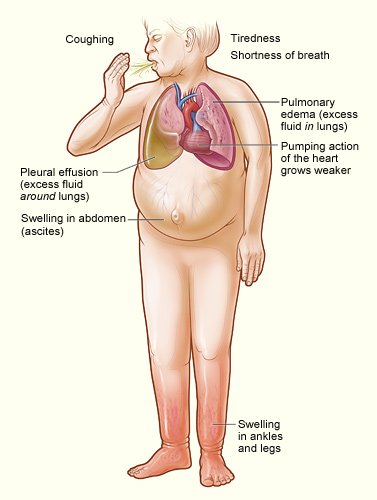What are the symptoms of heart failure?
The Heart Failure Society of America coined the FACES mnemonic to help identify the main symptoms of heart failure:
- Fatigue – Feeling tired and weak all the time
- Activities limited – Difficulty doing usual activities like carrying groceries
- Chest congestion – Persistent cough
- Edema or ankle swelling – Swollen ankles, feet, leg, and belly
- Shortness of breath – Breathless while walking, sitting, or lying down flat

Illustration showing the major signs and symptoms of heart failure. Source: NHLBI
The cough may be dry or frothy and blood-tinged, and may be worse when lying down. Some people develop raspy breathing or wheezing. The shortness of breath is usually noticed during physical activity, but it can also be a problem when lying down. You may wake up suddenly to catch your breath, and may need extra pillows to sleep.
Other symptoms of heart failure include:1-3
- sudden weight gain – more than 2 pounds in 1 day or 5 pounds in 1 week
- bulging of the veins in the neck
- chest pain
- a racing heartbeat
Heart failure symptoms may appear suddenly, but usually they start gradually and become more severe over time. Often these symptoms—especially shortness of breath and fatigue—are mistaken for signs of aging or overweight. For this reason, some women may not know they have heart failure for many years. If you experience any of these symptoms, it is important not to dismiss them—see your doctor to get a checkup.
People with asthma or other lung disease (such as chronic obstructive pulmonary disease, or COPD) often have shortness of breath that they assume is due to an existing condition. In many cases, heart and lung disease occur together. If you are experiencing shortness of breath more often or more severely than usual, see your doctor. She or he may order tests to determine whether your breathlessness is caused mainly by your heart, your lungs, or both.
Do women experience different symptoms than men?
The symptoms of heart failure are the same in women and men, but women with chronic heart failure may be more likely to have swollen ankles (for example, shoes feeling tight), shortness of breath (for example, trouble breathing when lying flat), and bulging of the veins in the neck.4, 5
What causes these heart failure symptoms?
The underlying cause of all heart failure symptoms is the heart’s inability to pump blood efficiently. Most of the symptoms are a result of the congestion that happens when fluid backs up. Other symptoms are caused by the inadequate supply of blood to the rest of the body.
Common Heart Failure Symptoms & Their Causes
| Symptom | Cause |
| Shortness of breath | Blood returning to the heart backs up. This causes fluid to leak into the lungs, making it harder for you to breathe. |
| Wheezing or persistent cough | When fluid leaks into the lungs, it often causes a cough—the lungs’ way of trying to remove the fluid. Some people also have wheezing that mimics asthma. |
| Swollen ankles, legs, feet or belly | Because the heart isn’t pumping effectively, blood and fluid collects around the body. Gravity causes much of this fluid to collect in the feet, ankles, and legs. |
| Fatigue, tiredness | Because the heart isn’t pumping out enough blood to the body, blood is rationed out first to the most vital organs (the heart and brain); all other organs have to work with a shortage of blood. Without enough oxygen-rich blood, the body tires easily. |
| Increased heart rate | The heart beats faster so that it can compensate for its weaker pumping ability. |
| Weight gain | The buildup of excess fluid can cause sudden increase in weight. |
| Lack of appetite | Fluid backs up in the liver, causing the liver to enlarge to such an extent that the stomach can’t expand much. This makes you feel full after eating small amounts of food. |
| Nighttime urination | As the blood is pulled away from your kidneys during the day to be used by other organs and tissues, less urine is produced. When you lie down at night, the kidneys get more blood and produce more urine. Some medications used to treat high blood pressure may also increase your urine output. |
Symptoms vary slightly depending upon which side of the heart is failing: the left or the right. The left side of the heart receives oxygen-rich blood from the lungs. When the left side of the heart fails, fluid builds up in the lungs, causing shortness of breath and a wheezing or frothy cough. The right side of the heart receives blood from the rest of the body. When it loses pumping power, the fluid backs up in the body, causing swelling (edema) in the feet, ankles, legs, liver, and belly. Click here for more information on the different types of heart failure.
If I have been diagnosed with heart failure, what symptoms should I watch for?
Call 9-1-1 if you have:
- Chest pain that lasts longer than 15 minutes and is not relieved with rest or 3 tablets of nitroglycerin
- Fainted or lost consciousness
- Severe, constant shortness of breath
The following symptoms should be taken very seriously and reported to your doctor immediately. They may be signs that your heart failure is getting worse.
- Increasing shortness of breath while resting or doing simple tasks like dressing yourself
- Waking up frequently in the middle of the night short of breath
- Racing heart that makes you feel dizzy
- Growing more tired and weak
- Progressive swelling in your belly or pain in your stomach
- Losing your appetite
- Coughing up blood-tinged phlegm
- Increased swelling in your limbs
- Rapid weight gain (for example, 5 or more pounds in 1 week)
Weigh yourself every day and monitor your symptoms regularly. The more familiar you become with your symptoms, the sooner you’ll be able to notice if they’re getting worse or you’re developing new symptoms. Notify your doctor of any changes.
How are the symptoms of heart failure classified?
Doctors classify heart failure symptoms based on how much they limit your daily activity. They use the New York Heart Association (NYHA) classification system to help determine how severe your heart failure may be. The NYHA system classifies symptoms from mild (Class 1) to severe (Class 4). Click here for more information on the NYHA classification system.
Do more severe heart failure symptoms mean more serious heart problems?
Not always. Your physician will first need to decide whether your symptoms are related to your heart. For instance, it is possible to have shortness of breath and fatigue even though tests show your heart is pumping out a healthy amount of blood.1 Some people may be out of shape and become short of breath when they exercise, even if they don’t have heart failure. Others may have lung disease like asthma or emphysema that mimic the symptoms of heart failure or make them appear worse than they actually are.
If your symptoms are due to heart failure, the problem could be one that is solved by simple changes like taking your medication on time every day, sticking to a low salt diet, or reducing the amount of fluids you drink. Other times, medical or surgical treatment can help you feel better and live longer. If you experience heart failure symptoms, see your doctor to get them checked out so he or she can determine the cause and get you started on the proper treatment.
References
- Hunt SA. ACC/AHA 2005 guideline update for the diagnosis and management of chronic heart failure in the adult: a report of the American College of Cardiology/American Heart Association Task Force on Practice Guidelines (Writing Committee to Update the 2001 Guidelines for the Evaluation and Management of Heart Failure). J Am Coll Cardiol. Sep 20 2005;46(6):e1-82.
- Satpathy C, Mishra TK, Satpathy R, Satpathy HK, Barone E. Diagnosis and management of diastolic dysfunction and heart failure. Am Fam Physician. Mar 1 2006;73(5):841-846.
- Radford MJ, Arnold JM, Bennett SJ, et al. ACC/AHA key data elements and definitions for measuring the clinical management and outcomes of patients with chronic heart failure: a report of the American College of Cardiology/American Heart Association Task Force on Clinical Data Standards (Writing Committee to Develop Heart Failure Clinical Data Standards): developed in collaboration with the American College of Chest Physicians and the International Society for Heart and Lung Transplantation: endorsed by the Heart Failure Society of America. Circulation. Sep 20 2005;112(12):1888-1916.
- Johnstone D, Limacher M, Rousseau M, et al. Clinical characteristics of patients in studies of left ventricular dysfunction (SOLVD). Am J Cardiol. Oct 1 1992;70(9):894-900.
- Lund LH, Mancini D. Heart failure in women. Med Clin North Am. Sep 2004;88(5):1321-1345, xii.
- Davies M, Hobbs F, Davis R, et al. Prevalence of left-ventricular systolic dysfunction and heart failure in the Echocardiographic Heart of England Screening study: a population based study. Lancet. Aug 11 2001;358(9280):439-444.



